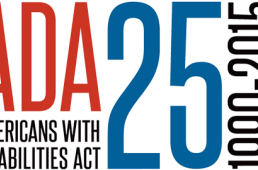
October 2, 2015 | by Michael Wilt
Categories: Affordable Housing, Construction, Home Rehabilitation/Repairs, Rental Housing
This year marks the 25th Anniversary of the Americans with Disabilities Act (ADA), which was signed into law by President George H.W. Bush on July 26, 1990. The law prohibits discrimination against individuals with disabilities in all areas of public life, including jobs, schools, transportation and all public and private places that are open to the general public.
Federal law defines disability as "Any person who has a physical or mental impairment that substantially limits one or more major life activities; has a record of such impairment; or is regarded as having such an impairment." The law stops short of listing disabilities, but generally, they include any physical or mental impairment that limits or prohibits the ability to walk, talk, hear, see, breathe, learn, perform manual tasks or care for oneself.
Housing and Protection for People with Disabilities
When it comes to housing, fair housing laws rather than the ADA provide protections to people with disabilities. Title III of the ADA, however, does include public and common use areas at housing developments that are open to the general public like the leasing office. Title II of the ADA also applies to programs, services, and activities provided or made available by state and local governments like a housing authority or campus housing at a public university.
Fair housing laws provide housing protections for people with disabilities. This includes protection against discrimination in housing, requiring housing providers to make reasonable accommodations for persons with disabilities, allowing persons with disabilities to make reasonable modifications, and requiring the design and construction of multifamily housing to be accessible. For more information on fair housing, we invite you to read an earlier blog entry on the topic.
The Homebuying Process for People with Disabilities
Century 21 conducted a recent survey of 503 individuals who either have a disability or live with someone who does. The results revealed "a strong need and desire among homebuyers with special needs for real estate sales associates who are trained in, and knowledgeable about, accessible housing." An overwhelming majority (83%) of respondents stated that having a real estate professional who is familiar with accessible housing would be beneficial to them. Almost half (49%) indicated having a difficult time finding a home that addresses their unique needs.
The results of the survery prompted Century 21 to launch a "Special Agent Learning Program" that trains "brokers and real estate agents on accessible housing and the needs of people with disabilities." Other resources for people with disabilities to reference during the home buying process include a guide provided by New Horizons Un-Limited, Inc. and tips from realtor.com.
As we celebrate 25 years of the ADA, we encourage professionals in the home buying profession to think about the unique circumstances people with disabilities face and how the industry can better respond to and address their needs. We also encourage you to view the video about The Foxworths, a visually impaired couple who purchased a home that meets their needs with the help of TSAHC, their REALTOR®, and lender.
On the House blog posts are meant to provide general information on various housing-related issues, research and programs. We are not liable for any errors or inaccuracies in the information provided by blog sources. Furthermore, this blog is not legal advice and should not be used as a substitute for legal advice from a licensed professional attorney.
TSAHC reviews all blog comments before they are posted to ensure a positive experience for our online community. Off-topic comments; hostile, derogatory or deliberately insulting comments; and comments specifically promoting goods and services will not be posted.
Approved comments will be published in their entirety. Personal information will not be removed unless it pertains to someone other than the person submitting the comment. For more information, please see our Comment Posting Guidelines.
To remove a previously submitted and published comment, please contact Anna Orendain at [email protected].
If you have a question regarding any of TSAHC's programs, please contact us.

But, I do not think that people are acting according to the statements in the constitution today. Since, many of the people have taken responsibilities (I mean some public health professionals) to take care of disable people, they have a little better life. The leaders should know the disabilities and limitations of the common people because they are elected to lead us and they have the right to follow the constitutional amendments.